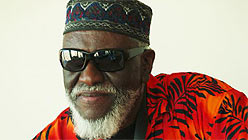Ornette Coleman. Sonny Rollins. Pharoah Sanders. All are jazz titans — all are saxophonists who have been playing for half a century and counting, with an enduring influence on an art form that was born in the American South. That’s where Sanders was brought up, in Little Rock, Arkansas, before a peripatetic career that included living in Oakland for many years, but now has him residing in Los Angeles. At 71, Sanders doesn’t perform as much as he once did, so any public concert draws scores of fans eager to see a man who played with the inimitable John Coltrane, when the form continued an experimental evolution that was summarily labeled “free jazz.”
Sanders, who performs several shows at Yoshi’s in Oakland this weekend, tells me he has actually considered retiring from public performance. The reason: his frustration with concert-goers who record his music on cameras and other electronic equipment, then sell copies. “Nowadays, people are stealing things and taping stuff,” Sanders says in a phone interview from his L.A. home. “I remember when I played at a place in Santa Cruz. I played a set, and when I got off the stage, my wife saw this guy in the audience who had (an illegal) hard copy. I told the guy at the club, but when I played there again, I found out the owner was (dealing in recordings without my permission). I have done some interviews and people were selling them on the Internet. It makes me wonder, should I play again? What should I do? Should I play in public or just play at home?”
For now — thankfully — the public concerts go on. To hear Sanders is to be immersed in a world of songs that are mesmerizing musical labyrinths. If there’s one song that epitomizes Sanders’ originality, it’s “The Creator Has a Master Plan,” a 32-minute tour de force that starts out with the trademark squawking of Sanders’ tenor sax, then settles into a flute, sax and piano-driven spiritual that eventually segues into more intense squawking, interspersed with lyrics that pronounce, “The creator has a master plan — peace and happiness for every man . . . The creator has a master plan, happiness thru all the land.” Released on the 1969 album, Karma, which was produced by Bob Thiele (he worked on Coltrane’s albums, too), “The Creator Has a Master Plan” has elements of spoken word, psychedelia, minimalism, and even balladeering. In short, the song is almost unclassifiable, especially because it cycles in and out of a booming intensity that — even for diehard jazz fans — can be challenging.
The “jazz” label is really too restrictive for Sanders, but it has provided the foundation that has taken him all over the world, including Morocco, where he recorded the 1994 album Trance of Seven Colors with Gnawa musicians, lute players, chanters, and rhythmists using iron castanets whose centuries-old music is designed to bring people into a trance state. Sanders found kindred spirits in Mahmoud Guinia and the other Gnawa musicians with whom he performed. The one country where Sanders still wants to perform, but hasn’t yet, is India. The last time Sanders played in New York, promoters approached him about doing concerts on the Indian subcontinent and, Sanders says, “I’m going to look them up and give them a call.”
In his personal music collection, Sanders might have more albums from India than he has of his own music (“I don’t have enough of my albums”), which is a startling admission until you hear Sanders say he dislikes hearing his old records. He says he notices mistakes he has made, self-described miscues on notes and sound that are imperceptible to anyone but him. He also says he grows bored of hearing the exact same version of his songs. Sanders is always looking to refine his playing. He’s always been restless.


